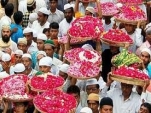Time First six days of Rajab (seventh month of the Islamic calendar)
Venue Dargah of Muinuddin Chisti, Ajmer
How to Reach Ajmer is well connected with most of the cities and towns of Rajasthan by rail as well as by road.
Significance Marks the death anniversary of the great Sufi saint, Khwaja Moin-ud-din Chisti.
Highlights Qawwalis (musical extravaganza) and Mushairaas (evening of poetic verses).
The Urs Fair is dedicated to Khwaja Moin-ud-din Chishti, the Sufi saint. It is organized on the death anniversary of the great Sufi Saint, during the first six days of Rajab (seventh month of the Islamic calendar). The venue of the Rajasthan Urs Fair is the memorial of the holy saint, situated in the lakeside city of Ajmer. The mortal remains of the saint lie buried in the Dargah Sharif (memorial of the saint) known as Chishti ki Dargah. Devotees of the Saint hold so much respect him, that the city of Ajmer is at times called Ajmer Sharif (Holy Ajmer).
The saint came from Persia and founded the Chishtia order of fakirs in India. Khwaja Moin-ud-din Chishti is also known by the name of Gharib Nawaz, the protector of the poor. This is so because the entire life he remained committed to the service of mankind. He lived a simple and austere life and graced this world by his presence for almost a hundred years. In the last days of his life, he retired to his cell and died in complete peace and solitude.
Lakhs of devotees from different communities assemble at the shrine of the saint at the time of the Urs Fair of Ajmer, Rajasthan. The devotees come not only from the various cities of Rajasthan, rather from all parts of the country. They visit the dargah to pay tribute to the Khwaja on his Urs (death anniversary). People coming to pray to the Khwaja and seek his blessings make offerings (nazrana) at the place where the remains of the Saint now rest. The offerings include rose and jasmine flowers, sandalwood paste, perfumes, incense, etc. Those who get their wishes fulfilled, along with those who come to pray, offer chadar, ghilaph and neema at the Dargah. Outside the sanctum sanctorum of the dargah, professional singers called qawwals can be seen singing the praises of the saint.







